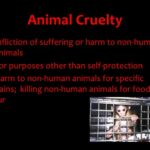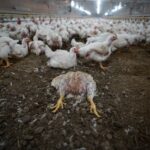As society becomes increasingly aware of the ethical implications surrounding our food choices, the act of consuming meat raises profound questions about animal welfare and the moral underpinnings of dietary practices. At the heart of this discourse lies a compelling argument: eating meat, inextricably linked to a system that often perpetuates animal cruelty, presents an ethical paradox that cannot be easily dismissed. While proponents of meat consumption frequently argue against this assertion, a closer examination reveals a mosaic of moral considerations that warrant our contemplation.
When considering the nexus between meat consumption and animal cruelty, it is essential to recognize the pervasive practices within industrial farming. The sheer volume of meat consumed in modern diets necessitates large-scale production methods that often prioritize efficiency over welfare. Factory farming epitomizes this approach, where animals are frequently confined in cramped, inhumane conditions. This confinement, together with lack of access to natural behaviors, leads to a myriad of distressing outcomes for the animals involved—a reality that starkly contrasts with the notion of ethical treatment.
The treatment of animals in factory settings is not merely a byproduct of economic demand; it is indicative of a systemic issue within agricultural practices. The commodification of life renders animals as mere units of production, robbing them of their intrinsic value and agency. From the moment these creatures are born, they are often subjected to a harsh existence, deprived of their natural instincts and subjected to painful procedures that many consumers remain blissfully unaware of. The use of antibiotics, for instance, not only serves to uphold production levels but also contributes to public health risks, which further complicates the ethical landscape surrounding meat consumption.
Yet, it is crucial to address the perspective of those who advocate for the consumption of meat. Many argue that eating meat is a natural and necessary part of human evolution. They point to historical context, noting that omnivorous diets have been integral to the survival of human communities for millennia. Furthermore, proponents of meat consumption often highlight the nutritional benefits derived from animal products, arguing that they provide essential nutrients that can be challenging to obtain from plant-based diets alone.
This defensive posture raises an apposite question: Does the biological framework of our species justify the ongoing cruelty inflicted upon animals in contemporary meat production? While no one can deny that humans have evolved as omnivores, the modern meat industry is no longer a reflection of historical practices entwined with sustainability and respect for life. Instead, it exemplifies a departure from humane values in the face of abundant alternatives.
Critics of the industrial agribusiness model are not solely motivated by a desire to eschew meat entirely; rather, they seek to promote more humane and ethical ways of producing animal products. Many advocate for practices such as regenerative agriculture, which emphasizes the symbiotic relationship between livestock and the environment. In this approach, animals are allowed to roam freely, engage in natural behaviors, and contribute positively to ecosystems, thereby mitigating some of the ethical concerns associated with conventional meat production.
Moreover, the rise of plant-based diets and alternatives gained traction among those seeking to align their consumption with their ethical beliefs while also addressing environmental issues. The advent of lab-grown meats represents a paradigm shift, one that challenges the long-held belief that eating meat must inherently lead to animal suffering. By harnessing technology, it is possible to create meat-like products without the ethical implications of traditional farming practices.
Disagreement remains within the discourse on meat consumption, and it is vital to recognize the validity of diverse viewpoints. Some individuals highlight cultural, economic, and social considerations that contribute to dietary choices, arguing that not everyone has equitable access to plant-based alternatives or the luxury of choice. These arguments demand compassion and understanding; they remind us that dietary shifts are not universally feasible or desirable for every community. Yet, the overarching ethical question persists: if alternatives are available, should we not advocate for their adoption in pursuit of a just society?
As the global population burgeons, the pressure on food systems intensifies. This context elevates the moral imperative to reconsider our choices, habits, and the far-reaching consequences of meat consumption. By fostering awareness around the conditions under which animals are raised and the resultant cruelty often implicated in those systems, society can cultivate a more conscientious approach to both diet and ethics. This involves critically examining not only the act of eating meat but also the structures that support it, evaluating their implications for our conscience and society as a whole.
Engaging in this dialogue is essential, as it compels us to confront uncomfortable truths about our food systems and the creatures within them. Whether one is inclined to embrace vegetarianism, opt for ethically sourced meats, or partake in more innovative alternatives, the central tenet remains: mindfulness in our dietary choices can lead to more humane treatment of animals. As we navigate these complex issues, it is imperative to approach the conversation with sincerity and an open heart, recognizing our collective responsibility towards all living beings.







